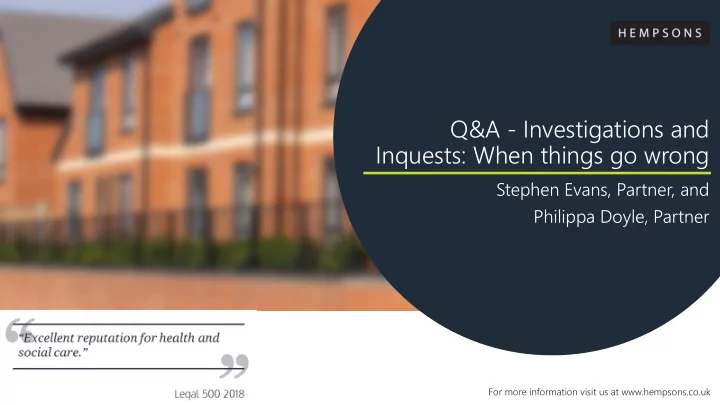

Q&A - Investigations and Inquests: When things go wrong Stephen Evans, Partner, and Philippa Doyle, Partner For more information visit us at www.hempsons.co.uk
Investigations and Inquests • Investigations • Internal • CQC • NHS England • Police • Inquests • Coroners • Who; when; where; how • Prevention of future deaths
Case Study 1
Case Study 2
Reducing risk: a positive circle • You cannot avoid the risk of an inquest and/or other investigation • You can have good practices that: • Reduce the risk of adverse events • Reassure investigators • Allow staff to feel as confident as they can be in giving the facts • Allow further learning • The most important thing that you have is information
Information • Where does it come from • Who receives it • Do they listen • Do they understand it • How is it recorded • How is it checked • How is it passed on • How is it used
Before any incident occurs • Training • Collecting and collating information • Assessments • Care plans • Audits
When an incident occurs • Have a plan – do people know what to do • Ensure appropriate care is given – to everyone • Preserve evidence/start putting it together/copying and printing • Stay in touch • Patient • Family • Hospital • Who needs to be officially notified • Keep records of what is done
Investigations (including Coroners) • Co-operate • Be clear with investigators (especially the police) what you want to do yourself and confirm they are happy for you to do it • Support staff • Present information coherently, openly and on time • Understand what you are entitled to receive and get it • Demonstrate you can learn • Internal investigations • Action plans • Action!
Investigations • Establish clear lines of communication • Meetings • Keep notes • Read and comment on any minutes • Draft reports • Take any opportunity to review and comment (in writing) on draft reports • Do you need to supply further evidence
Inquests • Know your Coroner and their staff • Support your staff • Keep in touch with anyone who leaves • Attend pre-inquest reviews • Establish clear lines of communication • Check everyone knows when and where the inquest will be • Make sure everything is presented to show your business as professional and caring • Attend the inquest
Getting support • Speak to other people who have “been there” • Lawyers can help • call our Social Care Advice Line for free initial advice – 01423 724056 – quoting “Social Care Advice Line” • Do you have legal expenses cover • You can use your choice of lawyers
Stephen Evans, Partner Contact t: t: 01423 724010 m: 07725 938 508 m: Disclaimer: These slides are made available on the basis that no liability is accepted for any errors of fact or opinion they may contain. The slides and presentation should not be regarded as a e: s.evans@hempsons.co.uk comprehensive statement of the law and practice in this area. Professional advice should be obtained before applying the information to particular circumstances. Philippa Doyle, Partner t: t: 01423 724028 m: m: 07850 793 968 e: p.doyle@hempsons.co.uk @hempsonslegal
Recommend
More recommend